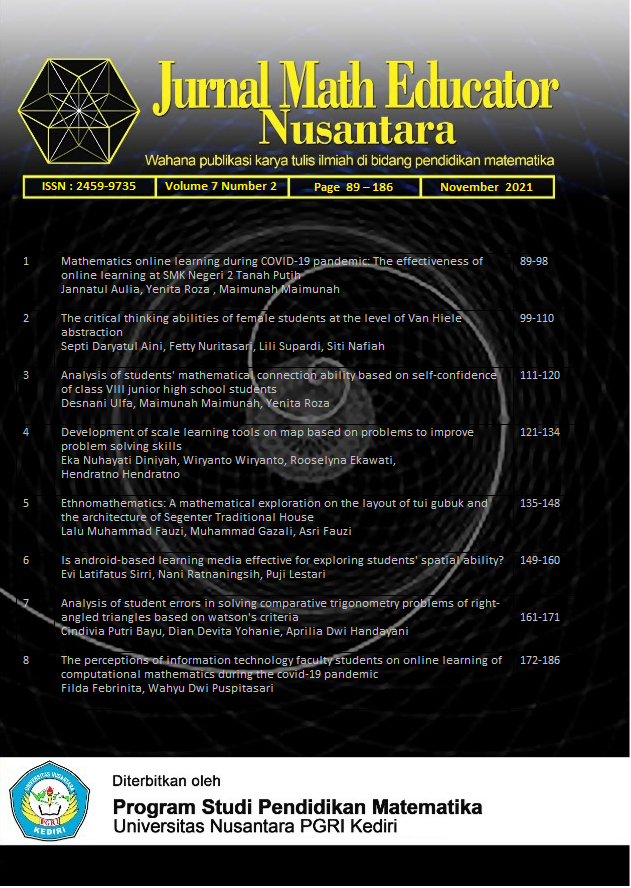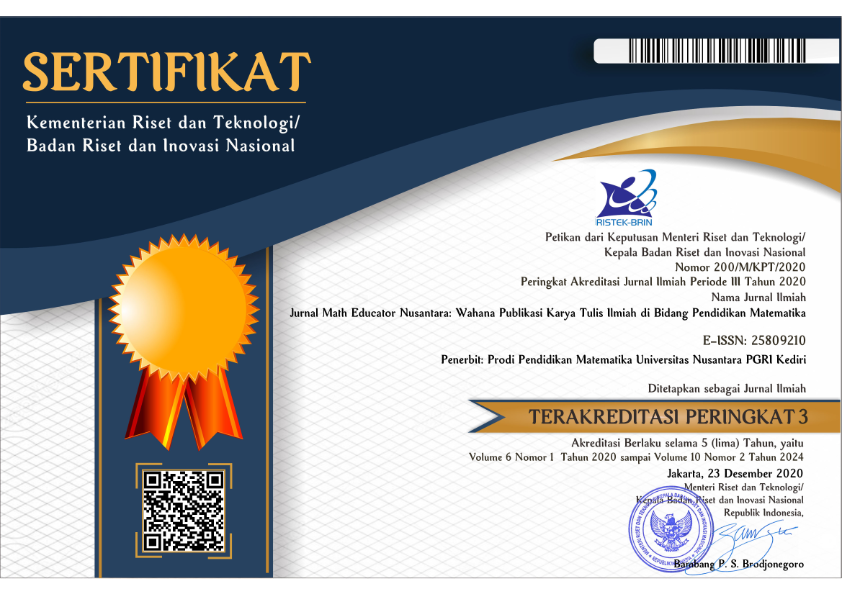Analysis of students' mathematical connection ability based on self-confidence of class VIII junior high school students
DOI:
https://doi.org/10.29407/jmen.v7i2.15938Keywords:
Analysis, Mathematical Connection Ability, Self-ConfidenceAbstract
This research was conducted due to the fact that the level of mathematical connection ability of junior high school students was still relative low. This study aims to describe students' mathematical connection abilities based on students' self-confidence, especially in the topic of building flat sides. Self-confidence is one of the psychological aspects to see the success of learning in the school. The subjects of this study were the second grade students which is in the class VIII B as many as 25 people from SMP Negeri 3 Bangkinang. This research used a descriptive method with a qualitative approach. The instruments used in this study include a mathematical connection ability test and a self-confidence questionnaire. The stages of the research consista of 4 stages, namely: 1) filling out the self-confidence questionnaire, 2) giving mathematical connection ability test questions, 3) analyzing the data, and 4) drawing the conclusions. The results of the research has shown that: 1) Overall students' mathematical connection abilities get an average of 57%, which means that students' mathematical connection abilities are in a fairly good category, 2) Students with high self-confidence have an average mathematical connection ability of 60 %, 3) Students with moderate self-confidence have an average mathematical connection ability of 58.6%, 4) Students with low self-confidence have an average mathematical connection ability of 52.6% which is included in the poor category. Based on the results of the study, it can be concluded that students who have high self-confidence have better mathematical connection abilities rather than students who have moderate and low self-confidence.
References
Andriani, D., & Aripin, U. (2019). Analisis Kemampuan Koneksi Matematik Dan Kepercayaan Diri Siswa SMP. JPMI (Jurnal Pembelajaran Matematika Inovatif), 2(1), 25–32.
Azizah, M., & Fauziyah, F. (2019). Pengaruh Kemampuan Koneksi Matematika Terhadap Hasil Belajar Siswa Pada Materi Garis Singgung Lingkaran SMPN 2 Sumbergempol Tulungagung. Jurnal Pendidikan Matematika RAFA, 5(1), 1–9.
Dwirahayu, G., & Firdausi, F. (2016). Pengaruh Gaya Berpikir Terhadap Kemampuan Koneksi Matematis Mahasiswa. Jurnal Penelitian Dan Pembelajaran Matematika(JPPM), 9(2), 210–221.
Hadin, H., Pauji, H. M., & Aripin, U. (2018). Analisis Kemampuan Koneksi Matematik Siswa MTS Ditinjau Dari Self Regulated Learning. JPMI (Jurnal Pembelajaran Matematika Inovatif), 1(4), 657–666.
Haeruman, L. D., Rahayu, W., & Ambarwati, L. (2017). Pengaruh Model Discovery Learning Terhadap Peningkatan Kemampuan Berpikir Kritis Matematis Dan Self-Confidence Ditinjau Dari Kemampuan Awal Matematis Siswa SMA Di Bogor Timur. Jurnal Penelitian Dan Pembelajaran Matematika(JPPM), 10(2), 157–168.
Hayu, E., Linna, R., Maimunah, M., & Roza, Y. (2019). Analisis Kemampuan Koneksi Matematis Siswa Dalam Menyelesaikan Masalah Pada Materi Perbandingan. AdMathEdu: Jurnal Ilmiah Pendidikan Matematika, Ilmu Matematika Dan Matematika Terapan, 9(1), 11–20.
Hendriana, H., Slamet, U. R., & Sumarmo, U. (2014). Mathematical Connection Ability and Self-Confidence (An experiment on Junior High School Students Through Contextual Teaching and Learning With Mathematical Manipulative). International Journal of Education, 8(1), 1–11.
Indriani, L. F., Yuliani, A., & Sugandi, A. I. (2018). Analisis Kemampuan Penalaran Matematis dan Habits Of Mind Siswa SMP Dalam Materi Segiempat Dan Segitiga. Jurnal Math Educator Nusantara(JMEN), 4(2), 87–94.
Jatisunda, M. G. (2017). Hubungan self-efficacy Siswa SMP dengan Kemampuan Pemecahan Masalah Matematis. Jurnal THEOREMS(The Original Research of Mathematics), 1(2), 24–30.
Kumalasari, A., & Putri, R. O. P. E. (2013). Kesulitan Belajar Matematika Siswa Ditinjau Dari Segi Kemampuan Koneksi Matematika. Seminar Nasional Matematika Dan Pendidikan Matematika FMIPA UNY Yogyakarta, 7–14.
Lestari, K. E., & Yudhanegara, M. R. (2017). Penelitian Pendidikan Matematika. Bandung: Refika Aditama.
Malinda, P., & Minarti, E. D. (2018). Pengaruh Self Confidence Terhadap Kemampuan Koneksi Matematis Siswa SMP. Jurnal Pendidikan Tambusai, 2(6), 1829–1837.
Muhamad, N. (2016). Pengaruh Metode Discovery Learning untuk Meningkatkan Representasi Matematis dan Percaya Diri Siswa. Jurnal Pendidikan Universitas Garut, 9(1), 9–22.
Nurafni, A., & Pujiastuti, H. (2019). Analisis Kemampuan Koneksi Matematis Ditinjau Dari Self Confidence Siswa : Studi Kasus Di SMKN 4 Pandeglang. ANARGYA: Jurnal Ilmiah Pendidikan Matematika, 2(1).
Nurhayati, A. (2014). Meningkatkan Kemampuan Koneksi Matematis, Self-Confidence Siswa Melalui Penerapan Pendekatan Pembelajaran Saintifik Berbantuan Persoalan Open-Ended (Tesis). Bandung: Universitas Pendidikan Indonesia.
Nurul, N., A, O., & Sylviana, Z. L. (2019). Analisis Kemampuan Koneksi dan Komunikasi Matematis Ditinjau dari Kepercayaan Diri Siswa SMP. JPMI (Jurnal Pembelajaran Matematika Inovatif), 2(2), 57–64.
Pitriyani, P., Fitrianna, A. Y., Malinda, P., & Hajar, M. S. (2018). Analisis Kemampuan Koneksi Matematik Siswa MTs Ditinjau Dari Self-Confidence. Jurnal Penelitian Dan Pembelajaran Matematika(JPPM), 11(1), 105–115.
Pratiwi, I., Yulianti, D., Malinda, P., Pitriyani, P., Siti Hajar, M., & Hidayat, W. (2018). Pengaruh Self Confidence Siswa SMP Terhadap Kemampuan Berpikir Kreatif Matematis Siswa. JPMI: Jurnal Pembelajaran Matematika Inovatif, 1(4), 667–672.
Purwasih, R. (2015). Peningkatan Kemampuan Pemahaman Matematis Dan Self Confidence Siswa MTs Di Kota Cimahi Melalui Model Pembelajaran Inkuiri Terbimbing. Jurnal Ilmiah STKIP Siliwangi Bandung, 9(1), 16–25.
Sofiah, E. S., & Nurjamil, D. (2019). Analisis Kemampuan Koneksi Matematik Siswa SMP Ditinjau dari Kemandirian Belajar. Seminar Nasional Magister Pendidikan Matematika Universitas Siliwangi, 195–203.
Suhandri, S., Nufus, H., & Nurdin, E. (2017). Profil Kemampuan Koneksi Matematis Mahasiswa Dalam Menyelesaikan Masalah Matematika Berdasarkan Level Kemampuan Akademik. Jurnal Analisa, 3(2), 115–129.
Downloads
Published
Issue
Section
License
Authors who publish with this journal agree to the following terms:
- Copyright on any article is retained by the author(s).
- The author grants the journal, the right of first publication with the work simultaneously licensed under a Creative Commons Attribution License that allows others to share the work with an acknowledgment of the work’s authorship and initial publication in this journal.
- Authors are able to enter into separate, additional contractual arrangements for the non-exclusive distribution of the journal’s published version of the work (e.g., post it to an institutional repository or publish it in a book), with an acknowledgment of its initial publication in this journal.
- Authors are permitted and encouraged to post their work online (e.g., in institutional repositories or on their website) prior to and during the submission process, as it can lead to productive exchanges, as well as earlier and greater citation of published work.
- The article and any associated published material is distributed under the Creative Commons Attribution-ShareAlike 4.0 International License














